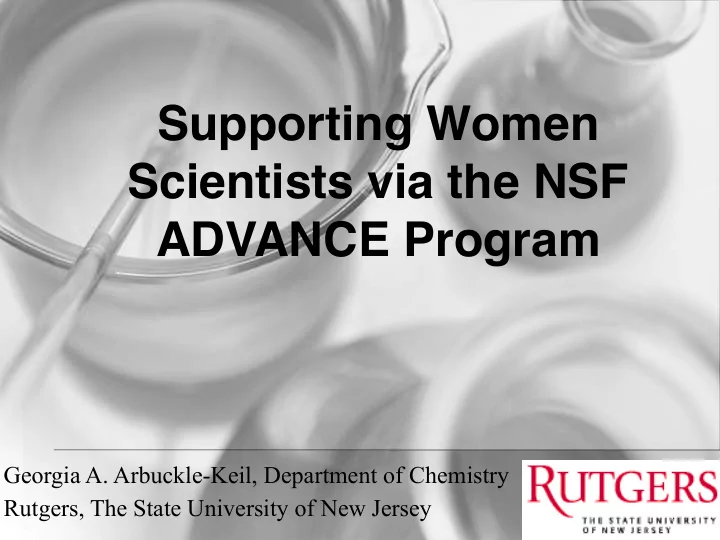

Supporting Women Scientists via the NSF ADVANCE Program Georgia A. Arbuckle-Keil, Department of Chemistry Rutgers, The State University of New Jersey
Goals of NSF ADVANCE (NSF 0941 Publication) • Develop systemic approaches to increase the representation & advancement of women in academic science, technology, engineering & mathematics (STEM) careers, thereby contributing to a more diverse science & engineering workforce • 3 Types of Projects: Institutional Transformation (IT); IT- Catalyst; Partnerships for Adaptation, Implementation & Dissemination (PAID) • IT: comprehensive programs for institution-wide change; must include research component to study effectiveness of proposed innovations • PAID: adaptation & implementation of materials, tools, research, & practices; dissemination & diffusion of materials, Solicitation: (09-504)
ONE UNIVERSITY: 3 DISTINCT LOCATIONS • Most well-known campus: New Brunswick or Piscataway (PhD Chemistry) • Newark campus (also offers PhD Chemistry) • Camden campus: Predominantly Undergraduate Institution (PUI) (MS Chemistry)
ONE UNIVERSITY: THREE DISTINCT LOCATIONS Demographics: • Douglas College – Women’s College • Female chemistry faculty became part of Rutgers University Department of Chemistry • One of the larger (percent women faculty) (~35% 2008)
DEMOGRAPHICS • Campus Campus – originally College of South Jersey • Predominantly Undergraduate Institution (PUI) Currently: 25% female (n = 4) Soon to be 20% (n = 5) Over a decade ago: 50% female (n = 6)
Comparison Between Campuses Compiled for the RU-FAIR Annual Report 2010 NSF HRD-0810978 (D. Valentine)
Number of Faculty in SEM Disciplines Difference between number of faculty increase with rank RU-FAIR Annual Report 2010 (NSF HRD-0810978)
Full-time SEM Women Faculty at Rutgers For Rutgers University as a whole, the percent of women faculty in science, engineering & mathematics (SEM) disciplines decreases with increasing rank RU-FAIR Annual Report 2010 (NSF HRD-0810978)
Women In Chemistry (3 campuses) (3 years) • New Brunswick: ~ 30% (n = 40) • Newark: ~20% (n = 14) • Camden: (n = 4) 2009-10 (n = 5) 2010-11 RU-FAIR Annual Report 2010 (NSF HRD-0810978)
Demographics : SEM Disciplines (Camden) • Comparison with available pool of PhD degreed women • Camden campus needs improvement RU-FAIR Annual Report 2010 (NSF HRD-0810978)
NSF ADVANCE GRANT FALL 2008 • Office for the Promotion of Women in Science, Engineering and Mathematics (WiSEM) • Profiles of Women Faculty: http:// sciencewomen.rutgers.edu/profiles • Rutgers University for Faculty Advancement & Institutional Re-imagination (RU-FAIR) http:// rufair.rutgers.edu • RU-FAIR Mini-grants; RU-FAIR Life Cycle Grants • RU-FAIR Professors (focus on specific campus environment)
ACTIVITIES IN CAMDEN • Focus Group • Exit Interviews • Grant Workshop(s) • Work-Life Balance Workshop • Mentoring • Recruitment • Communication
EXIT INTERVIEW SUMMARY • Camden only: small group physical science tenure-track faculty (male & female) • Resources needed: technicians, administrative support, grant support, laboratory facilities and equipment • Professional Development: need for research collaborations (small departments) • Promotion Criteria: teaching valued by departments yet not major part of tenure/ promotion decision (grants/papers required)
FOCUS GROUP • Invited all science faculty including social science • Majority female in social science departments (satisfied with informal mentoring) • Resources: grant writing/administrative support needed • Rutgers has a policy of “stopping the tenure clock” for child birth • Women felt more obligated to attend university events • Supportive role of women in campus functions, but may deter individual research progress
WORKSHOPS • Grant Workshop • Work-Life Balance • Leadership • Negotiation • Coaching
CONCERNS • Communication (at Camden & between campuses) • Challenge of traveling to other campuses • Video conferencing option • Time for everything we desire . . .
Advantages of Professional Organizations • American Chemical Society (ACS) • COACh (http://coach.uoregon.edu): Committee on the Advancement of women in Chemistry; excellent, affordable training (Highly recommend!) • Local section ACS networking: ability to meet other women faculty from other institutions • Networking with women at ACS national meetings • AWIS (http://www.awis.org) • ASA (http://www.asa3.org)
SUMMARY • NSF ADVANCE Support • One University: 3 campuses: unique concerns/needs • PUI more like liberal arts institution • Mentoring support throughout career • Reach out to others • Care for colleagues
ACKNOWLEDGEMENTS • RU-FAIR NSF Award to Rutgers University (HRD-0810978) • NB Staff: Christina Leshko, Doreen Valentine, Natalie Batmanian • Co-PIs: Joan Bennett, Pat Roos, Nancy Rosoff • RU-FAIR Faculty: Judith Weis, Maggie Shiffrar, Helen Buettner • RU-NB Faculty: Kathryn Uhrich, Lisa Klein • New Assistant in Camden: Daitza Frydel Any opinions, findings, conclusions or recommendations expressed in this material are those of the author(s) and do not necessarily reflect the views of the National Science Foundation.
Recommend
More recommend